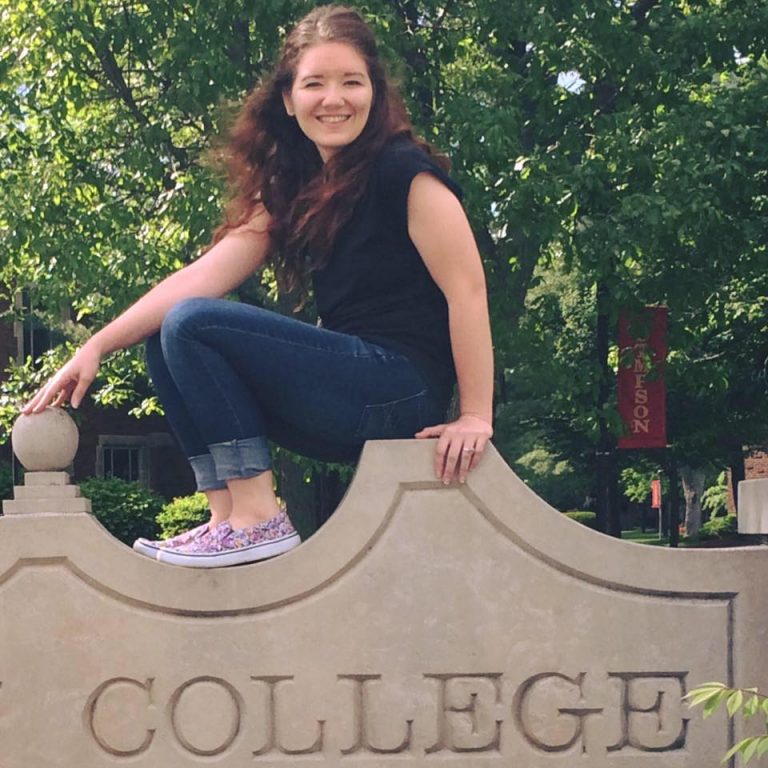Student Spotlight on Resilience
Speaking out about anything you’ve struggled with is not easy. There’s the risk of judgment, the fear you’ll be misunderstood or that people won’t care. However, openness, honesty and self-disclosure can lead to strength and empowerment, not only your own but others as well.
The first 18 years of my life I worked to maintain a daily facade, afraid to let anyone see my fragile self. My childhood foundation was one of shame, pain, and self-loathing due to many factors beyond my control. Because of this, I constructed a sense of self that lead to the development of disordered eating and anxiety at a young age.
It wasn’t until I applied for college that I truly began the process of healing for the first time in my life. I established a treatment team at Simpson in preparation for my freshman year (dietician, physician, and therapist). This was my first step toward advocating for myself and healing.
In the beginning stage of my journey, I wasn’t trying to hide the fact that I was struggling, I just didn’t know how to put what I’d been through or was going through into words. But over time I started feeling more and more comfortable sharing with my support team how I was doing and what I was going through. By this time, my support team consisted of student resources in the Kent Center and all the resources in the Center in Dunn Library as well as the TRIO team on the third floor of Dunn.
During my exploration of countless academic areas, I noticed myself gravitating to areas of study that revolved around nutrition and exercise. When I shared this information with my treatment team, they had concerns about my health and well-being because of the possibility that this could turn into a preoccupation with these areas that could sabotage my recovery. In order for me to move forward, my treatment team and I decided it would be best to share my health history with a few faculty and staff members in case I needed any accommodations which would minimize my stress and allow me to focus on my health.
At this point in time everything in my life seemed to be going well and I finally felt as though I was able to walk across campus and sit in class without appearing or actually struggling with anxiety. However, out of nowhere, I woke up one morning with severe pain in the lower right side of my abdomen. I could barely move and was unsure of what to do. I called my mom, who told me to take some ibuprofen, use my heating pad, and nap it off which seemed to help.
Several months later, the pain began reoccurred, increasing in frequency and intensity. After receiving various explanations and seemingly no answers, I found myself having to return home from campus for the summer along with the possibility of taking a medical leave.
Fortunately, after visiting a gynecologist, the word “Endometriosis” was said to me for the first time. After having surgery to diagnosis the disease I returned to campus for my junior year. However, no matter how much I rested, tried to eat the “right” foods, my body still interfered with my ability to manage the demands of college.
Although I was receiving academic support services I found myself spending more of my days planning out my homework schedule so that I would have plenty of extra time, while dealing with pain. I was emailing my professors asking for extensions on projects and telling them why I had to miss their classes.
It wasn’t long before I was put in contact with Accessibility Services to discuss my health needs, to receive necessary accommodations and to work on developing new skills. I was not reluctant to disclose my illness but worried about being placed in the role of being a health educator to others before I was ready. Many students continue to feel there is a stigma associated with having an invisible and unpredictable illness. I was not made a spokesperson or support person, though. My fears had been unfounded.
Through the process of becoming more self-aware, I realized the importance and power of advocating for myself when it comes to my health. I learned that documentation helps my professors have the information they need, and they always using discretion, keeping it confidential. I now know that if and when ongoing medical issues arise, a plan will be formulated to help me in any way possible. Lastly, collaboration between myself, my professors, and Accessibility Services has not only increased awareness and understanding of my health issues but certainty give me the awareness that I am resilient and powerful and that I will succeed.
AUTHOR’S NOTE
 Lauren is the first in her family to attend a four year university/college to attain a bachelor’s degree. She is majoring in Philosophy and minoring in Exercise Science and Women & Gender Studies. She has been involved in and chaired in several organizations on campus. She is preparing for her first semester abroad in Oslo, Norway this Fall and is targeted to graduate in the Spring.
Lauren is the first in her family to attend a four year university/college to attain a bachelor’s degree. She is majoring in Philosophy and minoring in Exercise Science and Women & Gender Studies. She has been involved in and chaired in several organizations on campus. She is preparing for her first semester abroad in Oslo, Norway this Fall and is targeted to graduate in the Spring.